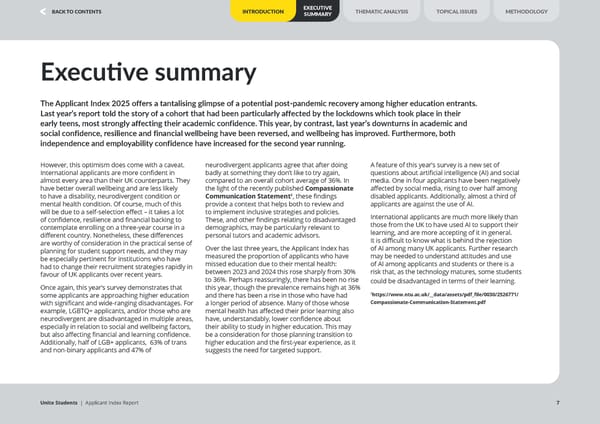Executive summary The Applicant Index 2025 offers a tantalising glimpse of a potential post-pandemic recovery among higher education entrants. Last year’s report told the story of a cohort that had been particularly affected by the lockdowns which took place in their early teens, most strongly affecting their academic confidence. This year, by contrast, last year’s downturns in academic and social confidence, resilience and financial wellbeing have been reversed, and wellbeing has improved. Furthermore, both independence and employability confidence have increased for the second year running. However, this optimism does come with a caveat. International applicants are more confident in almost every area than their UK counterparts. They have better overall wellbeing and are less likely to have a disability, neurodivergent condition or mental health condition. Of course, much of this will be due to a self-selection effect – it takes a lot of confidence, resilience and financial backing to contemplate enrolling on a three-year course in a different country. Nonetheless, these differences are worthy of consideration in the practical sense of planning for student support needs, and they may be especially pertinent for institutions who have had to change their recruitment strategies rapidly in favour of UK applicants over recent years. Once again, this year’s survey demonstrates that some applicants are approaching higher education with significant and wide-ranging disadvantages. For example, LGBTQ+ applicants, and/or those who are neurodivergent are disadvantaged in multiple areas, especially in relation to social and wellbeing factors, but also affecting financial and learning confidence. Additionally, half of LGB+ applicants, 63% of trans and non-binary applicants and 47% of neurodivergent applicants agree that after doing badly at something they don’t like to try again, compared to an overall cohort average of 36%. In the light of the recently published Compassionate Communication Statement1, these findings provide a context that helps both to review and to implement inclusive strategies and policies. These, and other findings relating to disadvantaged demographics, may be particularly relevant to personal tutors and academic advisors. Over the last three years, the Applicant Index has measured the proportion of applicants who have missed education due to their mental health: between 2023 and 2024 this rose sharply from 30% to 36%. Perhaps reassuringly, there has been no rise this year, though the prevalence remains high at 36% and there has been a rise in those who have had a longer period of absence. Many of those whose mental health has affected their prior learning also have, understandably, lower confidence about their ability to study in higher education. This may be a consideration for those planning transition to higher education and the first-year experience, as it suggests the need for targeted support. A feature of this year’s survey is a new set of questions about artificial intelligence (AI) and social media. One in four applicants have been negatively affected by social media, rising to over half among disabled applicants. Additionally, almost a third of applicants are against the use of AI. International applicants are much more likely than those from the UK to have used AI to support their learning, and are more accepting of it in general. It is difficult to know what is behind the rejection of AI among many UK applicants. Further research may be needed to understand attitudes and use of AI among applicants and students or there is a risk that, as the technology matures, some students could be disadvantaged in terms of their learning. 1https://www.ntu.ac.uk/__data/assets/pdf_file/0030/2526771/ Compassionate-Communication-Statement.pdf EXECUTIVE SUMMARY Unite Students | Applicant Index Report 7 INTRODUCTION THEMATIC ANALYSIS METHODOLOGY TOPICAL ISSUES BACK TO CONTENTS
 Unite Students Applicant Index - 2025 Page 6 Page 8
Unite Students Applicant Index - 2025 Page 6 Page 8